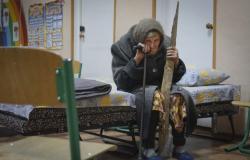
Arrested in Florida after speeding on a highway, Vitalii Kovalev, a chef who worked at several famous restaurants in the US, turned out to be an officer of the GRU, Russia’s military intelligence service, reports the Russian publication ” The Insider”.
PHOTO Capture via Insider
After his arrest in June 2020 following a freeway chase, he was questioned for tens of hours by an FBI officer who recently reported on American television that he alleged specific symptoms of the so-called “Havana syndrome” from which he was afflicted US personnel abroad since at least 2016.
Camera footage of the officers who detained and searched him showed that he had with him a soot-soot pot used to burn papers, notes with bank account details, a laptop, a commercially available device that could be used to erase GPS data recorded by the car and a Russian passport.
He was released under the name Vitalii Kovalev, born in Saint Petersburg in 1985.
His driver’s license was issued by the state of New York.
A strange incident occurred in the police car, when Kovalev appeared to carry on a 45-minute long conversation in a mixture of English and Russian.
No devices were found on him during the search, such as a headset connected to a mobile phone. He was dressed casually and had nothing suspicious on him except his glasses. “A deal is a deal”, insisted Kovalev during this mysterious conversation. “I didn’t kill anyone. I never killed. Never… No, I will be very sad here… then I will go to Russia”, he says, repeating the same thing several times. After which his glasses fall to the floor and, coincidentally or not, the conversation ends.
Kovalev served 26 months in prison in Florida from June 2020 to August 2022, although he was allowed to post $40,000 bail, according to his bank accounts. The reporters of the show “60 Minutes” learned that Kovalev attracted the attention of the FBI, whose interrogations, over a period of six months, accumulated 80 hours.
His story is relevant in the context of the joint journalistic investigation of “60 Minutes”, “The Insider” and “Der Spiegel” into what the US government calls “abnormal health incidents” formerly known as “Havana Syndrome”.
“Carrie,” one of the FBI counterintelligence agents who interviewed him at the time and is still on the job, told “60 Minutes,” with FBI clearance, that she was afflicted with symptoms consistent with Havana syndrome in the home them from Key West.
She says that suddenly, as if a switch had been flipped, she felt something gouge her right ear like a dentist’s burr, but much stronger. The noise was sharp and then he felt pressure and pain shooting through his jaw, neck and chest.
The incident happened again a year later when he took a new assignment in California. Carrie says she still suffers from debilitating symptoms and is not the same person anymore.
Mark Zaid, “Carrie’s” security clearance attorney, revealed, quoted by cbsnews.com, that he has more than 20 clients suffering from symptoms consistent with Havana syndrome. He said the victims included members of the CIA, the State Department and the FBI.
“The only common thread that I know of with FBI personnel, which is common to most if not all of my clients, other than family members of that employee, is that they were all dealing with something related to Russia.”Zaid said.
Kovalev told US authorities he was an unemployed chef from New York who was in Key West to visit the Ernest Hemingway House and Museum. A source familiar with the investigation told 60 Minutes that he traveled to the East Coast, booking rooms at the Trump hotel in Washington and then at another hotel in Miami but not checking out.
Key West is a known target – particularly of Russian foreign intelligence – due to the presence of several military and government facilities.
Who is Kovalev?
The journalistic investigation found out that Kovalev worked as a head chef at three popular US restaurants in New York and Washington.
Russian hockey players, international pop stars and US government officials regularly ate there, and Kovalev was a talented, highly regarded chef.
Examination of his visa application revealed that he graduated in 2009 from St. Petersburg State Marine Technical University, Russia’s leading naval engineering institute, and majored in military engineering. Kovalev was employed at the engineering and research and development laboratory Elektroavtomatika, a subsidiary of MIG, the manufacturer of military aircraft for the Russian Ministry of Defense.
Kovalev had a security clearance at the X3 level – not the highest, but indicating access to military secrets that would not have allowed him to leave Russia without possibly the approval of the Federal Security Service (FSB), the journalists found.
When he was released from prison in August 2022, he was reportedly warned by the US not to return to Russia, given his prolonged contact with the FBI. However, the following month he took the plane to Russia.
Where he didn’t stay long. In October, he told friends he was leaving on a “business trip” and to contact him by email. Records show that in December he took a train from St. Petersburg to Rostov-on-Don, near the border with Ukraine. On New Year’s Eve 2022, he crossed the border into the Lugansk region of Ukraine.
From there, Kovalev’s trail is lost.
A death certificate in his name was issued on February 8, 2023. Normally, in times of war, Russian authorities conduct investigations into how their soldiers are killed on the battlefield. They didn’t in this case. Kovalev’s death certificate states that he died of a hemothorax and multiple rib fractures, injuries caused by unexplained military actions while on active duty. According to military records, Kovalev was not mobilized – at least not officially. Was he a reserve officer and could he leave Russia without special permission?
Was he sent straight to the front to be killed, either at the hands of Ukrainian forces or his own army? What was he actually doing in the United States under what appears to have been the elaborate cover of an exceptional chef?
Kovalev’s family announced his death on social media on 1 March 2023. He was buried at Kazan Cemetery in Saint Petersburg the following day.
“I believe I was targeted – because I upset the wrong people for doing what I was doing,” that is, my duty to protect my country, Carrie, the FBI agent who interviewed Kovalev, told “60 Minutes.”
After seeing Kovalev in a clip promoting the investigation, a former senior US government official who worked in counterintelligence contacted journalists, revealing that he remembered the case of the alleged Russian spy. He claims he was known to the US government as a technical officer of the GRU, Russia’s military intelligence service, as well as a member of the FSB’s 16th Directorate cyber unit.
Members of the 16th Directorate, also known as Center 16, were indicted for a large-scale attack on the control systems of energy infrastructure targets in the US and other countries.
Unit 29155
The year-long joint journalistic investigation uncovered compelling evidence linking Havana Syndrome to a directed energy weapon used by agents of GRU Unit 29155.
Christo Grozev, journalist of the investigative magazine “The Insider” suggests that Kovalev was a Russian spy.
Kovalev studied at a military institute, learning about radio electronics, explained the Bulgarian journalist, known for his expertise in exposing Russian plots. Then, after two years of working in a military institute, Kovalev suddenly ended up as a chef in New York and Washington.
“It’s not an easy thing to just leave this behind. Once you’re in the military, you’ve been trained and the Ministry of Defense has invested in you, you’re at their disposal for the rest of your life.” Grozev explained.
Grozev discovered a death certificate issued last year, according to which Kovalev was killed on the front in Ukraine.
“One theory is that he was sent there to be eliminated,” Grozev said.
If it’s Russia, then the GRU’s 29155 intelligence unit is involved, he says, who revealed they discovered an accounting document that could link it to a directed energy weapon.
An officer from 29155 received a bonus for work done at “potential capabilities of non-lethal acoustic weapons…”.
There is also evidence that 29155 was present in Tbilisi, Georgia when the Americans reported incidents there. Grozev believes that members of 29155 were there to facilitate, supervise or possibly personally implement attacks on US officials using a sonic weapon.
Sources told “60 Minutes” that an investigation focused on Russian Albert Averianov, whose name appears in travel records and phone records alongside known members of 29155. He is also the son of the unit’s commander.
The incidents began in Tbilisi the day after a phone call, which was intercepted. The sources said a man asked in Russian: “Should they have flashing green lights?” and “should I leave it on all night?”.
The next day, an American official, his wife and child were reportedly hit. That same week, the wife of a Justice Department official, who asked “60 Minutes” not to make her name public for safety reasons, was startled by a sharp sound while in her laundry room in Tbilisi , in October 2021.
“It just went through my ears, it went through the left side, like it went through the window, into my left ear.”she said, explaining that she had a headache and threw up projectiles.
Afterward, he looked at the surveillance camera and saw a car he didn’t recognize. A man was also nearby. 60 Minutes sent a photo of Averianov to the woman, who said he “absolutely” looks like the man she saw outside.
“When I received this photo, I had a visceral reaction. It made me sick. I can’t say for sure that it is this man, but I can tell you that even to this day, when I look at him, I feel the same visceral reaction. And I can say for sure that this looks like the man I saw on the street.”
Grozev discovered that Averianov’s phone was switched off during the Tbilisi incidents, and sources say there is evidence that someone in Tbilisi logged into his personal email during this time. Grozev believes that this was most likely Averianov, which would confirm that he was in the city.
Tags: story alleged Russian spy arrested dead Ukraine FBI agent developed symptoms Havana syndrome questioning
-




